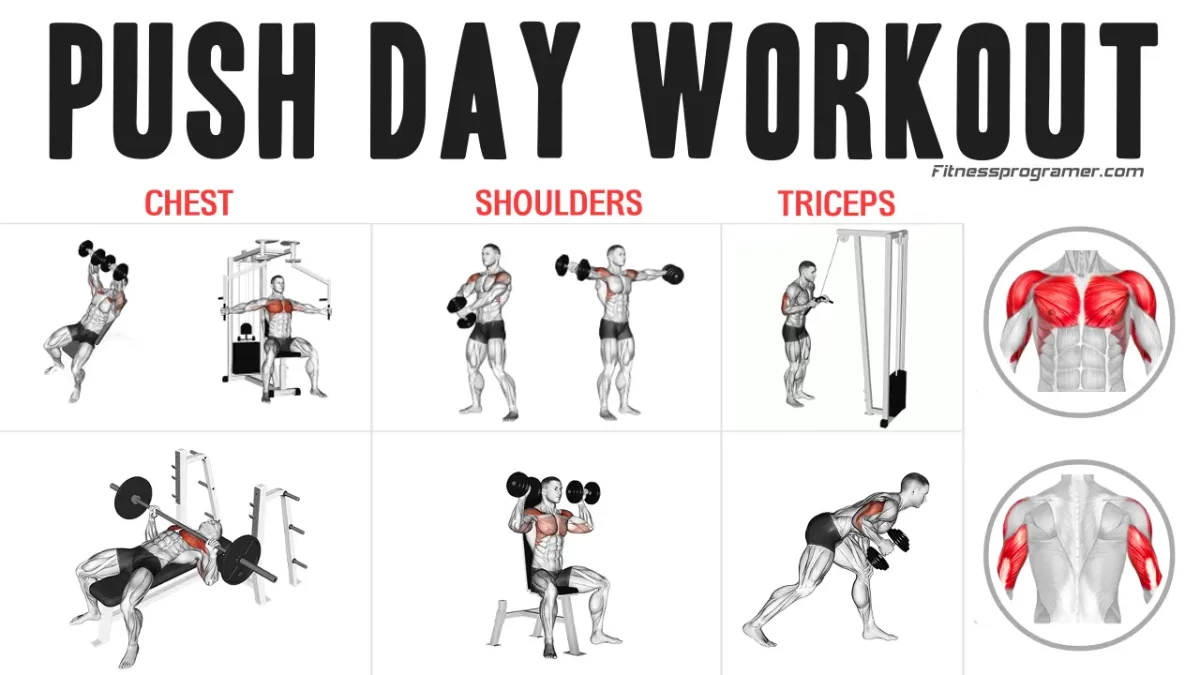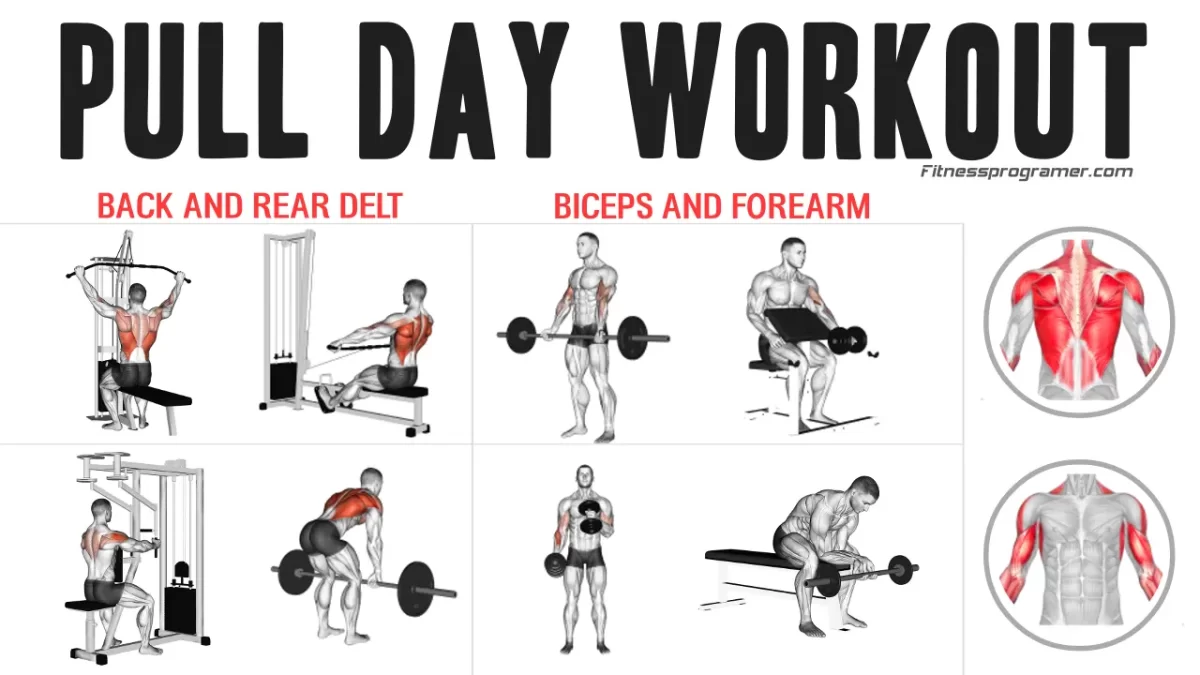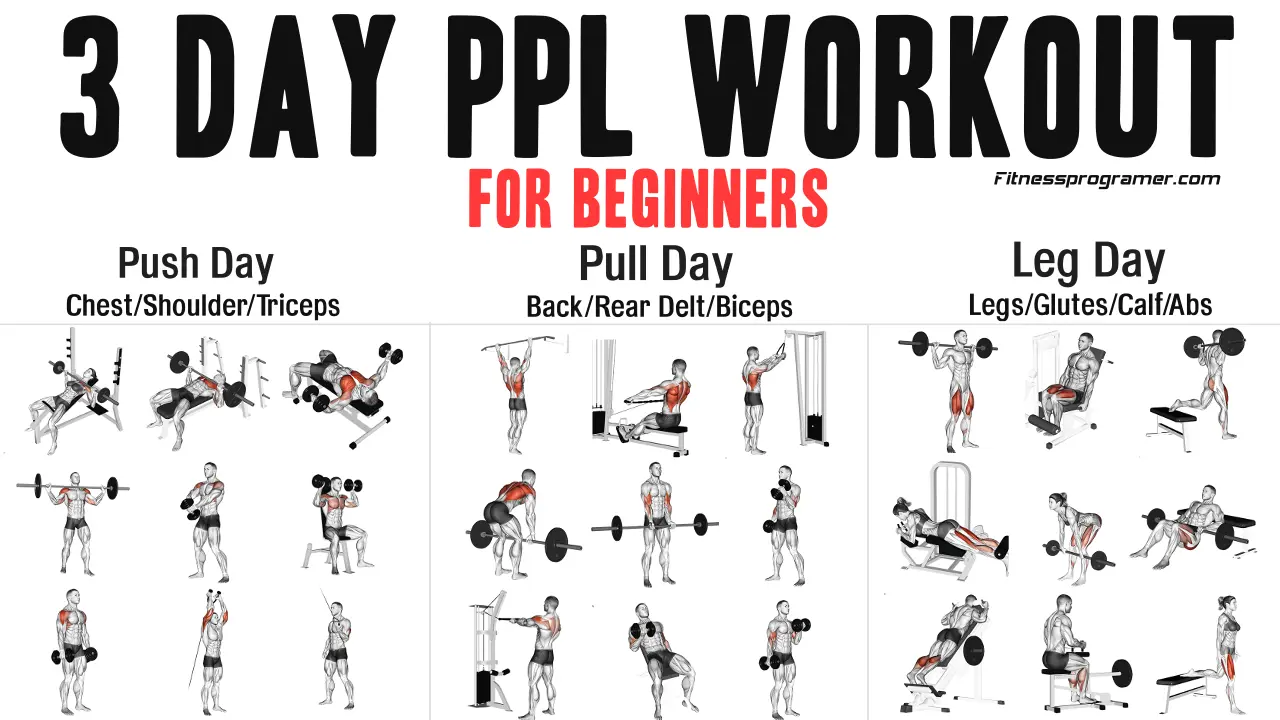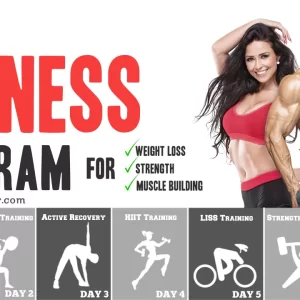Contents
The 3-day PPL workout routine for beginners is a popular method for building strength, muscle, and foundation. This method targets specific muscle groups while allowing them adequate recovery time by dividing workouts into push, pull, and leg days. It is preferred by both beginners and those with a busy schedule due to its simplicity and effectiveness.
Previously, I shared a detailed post on the basics of a PPL workout routine, explaining why this workout is so effective. If you’re not familiar with the foundation of PPL training, I recommend checking out that guide before starting this program.
In this article, I’ll dive deeper and provide a 3-day PPL workout plan that you can incorporate into your training schedule.
3-Day PPL Workout Routine Overview
The Push Pull Leg workout split divides your training into three primary days:
- Push Day: Focuses on the chest, shoulders, and triceps (pushing muscles).
- Pull Day: Targets the back, rear delts, biceps, and forearms (pulling muscles).
- Leg Day: Prioritizes the lower body and core.
For example, you might perform a push workout on Monday, a pull workout on Wednesday, and a leg workout on Friday. Then, you would repeat the cycle the following week. This method ensures balanced development and adequate recovery while ensuring each muscle group is targeted effectively.
If you have never lifted weights before or have no gym experience, I recommend following Robert’s 2-week basic bodybuilding program for beginners.
3-Day PPL Workout Routine
This 3-day PPL workout routine is designed to balance strength, hypertrophy, and recovery. Each exercise has been carefully selected to target each muscle group. Each day targets specific movements and muscle groups. Here is the 3-day PPL workout plan for beginners:
Day 1: Push Day – Chest, Shoulders, and Triceps

Push day is all about pressing movements that engage the upper body pushing muscles.
Here are the push day exercises:
- Bench Press 3 x 10-12
- Incline Dumbbell Bench Press 3 x 10-12
- Pec Deck Fly (3 x 12)
- Dumbbell Shoulder Press 3 x 10-12
- Lateral Raise 3 x 12
- Front Raise (optional) 3 x 10-12
- Tricep Pushdown 4 x 10-12
- Dumbbell Kickbacks 4 x 10-12
Day 2: Pull Day – Back, Biceps, and Forearms

Pull day focuses on pulling motions that develop the posterior chain and arms.
Here are the pull day exercises:
- Barbell Bent Over Row 3 x 10-12
- Lat Pulldown 3 x 12
- Seated Cable Row 3 x 12
- Rear Delt Fly Machine 3 x 12
- Barbell Curl 4 x 10-12
- DB Preacher Curl (optional) 3 x 10-12
- Hammer Curl 4 x 10-12
- Wrist Curl 3 x 12
Day 3: Leg and Ab Workout
Leg day ensures lower-body strength and core stability, essential for overall fitness and performance.
Here are the leg day exercises:
- Barbell Squat 3 x 10-12
- Bulgarian Split Squat 3 x 10-12
- Leg Curl 4 x 12
- Barbell Hip thrust 3 x 12
- Calf Raise 4 x 12
- Crunches 3 x 15
- Decline Sit-up 3 x 15
Is a 3-Day PPL Routine Effective?
For beginners, a 3-day Push-Pull-Legs (PPL) workout can be a good starting point for building strength, muscle, and a solid foundation. However, maximizing muscle growth requires paying attention to both training volume and frequency.
Research suggests that an optimal training volume for muscle building is approximately 12–20 sets per muscle group per week (1). With a 3-day PPL split, you typically train each major muscle group only once per week, which may not provide sufficient stimulus for optimal growth.
For beginners, this program can be effective initially as it helps lay a solid foundation and transitions you toward more advanced routines. However, for long-term progress, aiming to train each major muscle group at least twice per week is recommended (2). If you feel the volume is insufficient, you can add the exercises we’ve marked as optional.
While a 3-day PPL split can help beginners build confidence in the gym, those looking to maximize gains over time might consider transitioning to a bodybuilding or 6-day PPL workout, allowing for increased volume and frequency.
The Bottom Line
A 3-day PPL routine for beginners is a fantastic way to ease into strength training while building a solid foundation. Consider adding light cardio and mobility work on rest days to maintain overall fitness and reduce the risk of injury. Stay consistent, prioritize good form, and adjust weights to match your fitness level. Remember: Progress takes time, but with dedication, you’ll see results!



